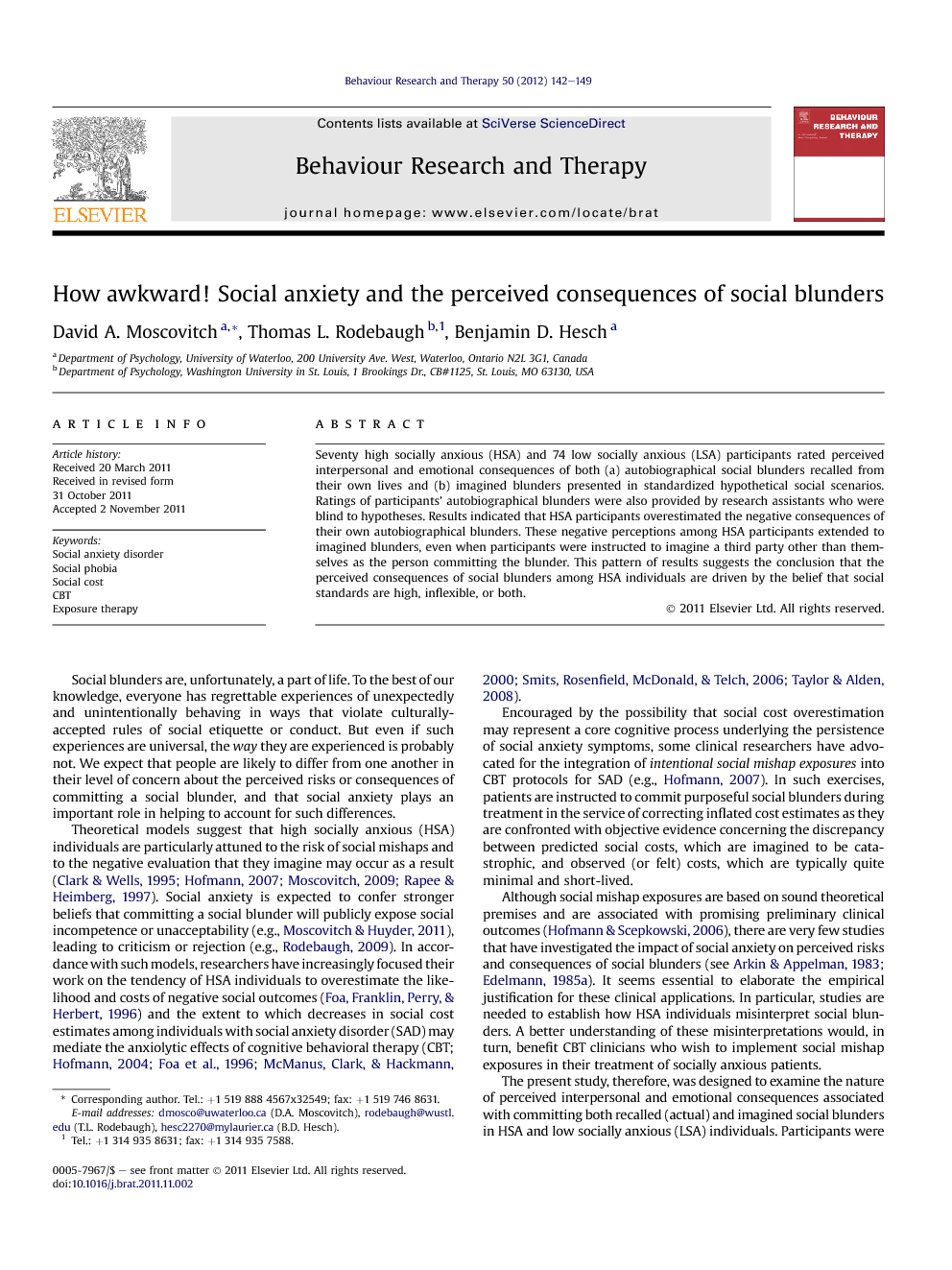Social blunders are, unfortunately, a part of life. To the best of our knowledge, everyone has regrettable experiences of unexpectedly and unintentionally behaving in ways that violate culturally-accepted rules of social etiquette or conduct. But even if such experiences are universal, the way they are experienced is probably not. We expect that people are likely to differ from one another in their level of concern about the perceived risks or consequences of committing a social blunder, and that social anxiety plays an important role in helping to account for such differences.
Theoretical models suggest that high socially anxious (HSA) individuals are particularly attuned to the risk of social mishaps and to the negative evaluation that they imagine may occur as a result (Clark and Wells, 1995, Hofmann, 2007, Moscovitch, 2009 and Rapee and Heimberg, 1997). Social anxiety is expected to confer stronger beliefs that committing a social blunder will publicly expose social incompetence or unacceptability (e.g., Moscovitch & Huyder, 2011), leading to criticism or rejection (e.g., Rodebaugh, 2009). In accordance with such models, researchers have increasingly focused their work on the tendency of HSA individuals to overestimate the likelihood and costs of negative social outcomes (Foa, Franklin, Perry, & Herbert, 1996) and the extent to which decreases in social cost estimates among individuals with social anxiety disorder (SAD) may mediate the anxiolytic effects of cognitive behavioral therapy (CBT; Hofmann, 2004, Foa et al., 1996, McManus et al., 2000, Smits et al., 2006 and Taylor and Alden, 2008).
Encouraged by the possibility that social cost overestimation may represent a core cognitive process underlying the persistence of social anxiety symptoms, some clinical researchers have advocated for the integration of intentional social mishap exposures into CBT protocols for SAD (e.g., Hofmann, 2007). In such exercises, patients are instructed to commit purposeful social blunders during treatment in the service of correcting inflated cost estimates as they are confronted with objective evidence concerning the discrepancy between predicted social costs, which are imagined to be catastrophic, and observed (or felt) costs, which are typically quite minimal and short-lived.
Although social mishap exposures are based on sound theoretical premises and are associated with promising preliminary clinical outcomes (Hofmann & Scepkowski, 2006), there are very few studies that have investigated the impact of social anxiety on perceived risks and consequences of social blunders (see Arkin and Appelman, 1983 and Edelmann, 1985a). It seems essential to elaborate the empirical justification for these clinical applications. In particular, studies are needed to establish how HSA individuals misinterpret social blunders. A better understanding of these misinterpretations would, in turn, benefit CBT clinicians who wish to implement social mishap exposures in their treatment of socially anxious patients.
The present study, therefore, was designed to examine the nature of perceived interpersonal and emotional consequences associated with committing both recalled (actual) and imagined social blunders in HSA and low socially anxious (LSA) individuals. Participants were selected based on a validated screening measure for SAD; the two groups, therefore, represent analogues of patient and normal control groups. We hypothesized, first, that HSA participants would perceive their own past blunders as being more emotionally2 and interpersonally costly than would LSA participants and objective raters. Second, we predicted that relative to their LSA counterparts, HSA participants would overestimate the costs of blunders described in hypothetical scenarios in which they imagined themselves as the central character. Third, on the basis of research suggesting that socially anxious individuals may apply a double standard in their judgments of social behavior by applying more stringent rules to evaluations of their own behaviors than evaluations of the behavior of others (e.g., Amir et al., 1998 and Voncken et al., 2006), we predicted that HSA and LSA participants would not differ in their perception of the consequences associated with blunders committed by an imagined third person. Finally, given the well-documented overlap between symptoms of social anxiety and depression in their relation to negative self-relevant cognitions within social and interpersonal contexts (e.g., Dozois & Frewen, 2006), we were interested in the extent to which the perceived consequences of social blunders may be driven by symptoms of social anxiety, symptoms of depression, or both. In this regard, because of evidence that changes in perceived cost of negative social outcomes mediates treatment outcome in social anxiety disorder (Hofmann, 2004), we were particularly interested in whether social anxiety was uniquely related to perceived costs of social blunders. Thus, we hypothesized that although both symptoms of social anxiety and depression would each likely account for some of the variance in perceived costs of autobiographical and imagined social blunders, symptoms of social anxiety would maintain a unique relationship with cost, above and beyond depression.


